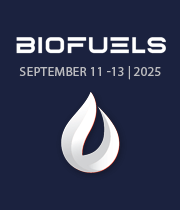Title : The influence of operational parameters on biological methanation in trickle-bed reactors
Abstract:
Biological methanation (BM) is a sustainable technology for methane (CH?) production, utilizing microbial metabolism to convert hydrogen and carbon dioxide. As a key component of Power-to-Gas (PtG) systems, BM facilitates energy storage and greenhouse gas mitigation by integrating surplus renewable electricity with CO? capture. The experimental setup includes two stainless steel trickle-bed reactors (TBRs) (200 mm in diameter, 1650 mm in height, 51.8 L in volume), specifically designed for ex-situ biological methanation as shown in Figure 1. TBR1 operates at atmospheric pressure, while TBR2 can sustain pressures up to 6 bar. A biofilm of methanogenic microorganisms colonizes porous HEL-X HXF12KLL media, enhancing gas-liquid mass transfer. To assess the impact of temperature on the methanation process, experiments were conducted on TBR1 at three temperature levels: 50, 55, and 60 °C. The temperatures were applied in descending order to allow microorganisms to gradually adapt to thermal variations. Experimental tests on TBR1 were performed at pH levels of 6.5, 7.0, and 7.5 to evaluate the effect of pH on process performance, while all other operational parameters remained constant. Additionally, both short and long-term dynamic operation tests were conducted on TBR1 to simulate its performance as a PtG storage system. Meanwhile, experiments on TBR2 were carried out at varying liquid pump velocities and intermittent operation frequencies to assess the impact of liquid recirculation on methane yield. Optimal methane purity and yield were observed at 55 °C, as indicated by the stable and high methane content (yellow markers) At 50 °C, methane purity remained relatively high but slightly lower compared to 55 °C, while at 60 °C, a decline in methane purity and production rate is evident (green markers). This trend suggests higher temperatures enhance methanogen enzymatic activity but negatively impact gas solubility, reducing mass transfer efficiency and overall process performance [1]. Figure 3 shows a clear correlation between pH and methane purity. Periods of lower pH (red triangles) correspond to reduced methane purity (green diamonds), while higher pH levels are associated with increased methane purity. This trend indicates that methanogenesis efficiency improves under slightly alkaline conditions, highlighting the importance of maintaining optimal pH levels to enhance biogas production. Cycles of starting and stopping (ranging from 2 to 6 hours), along with extended standby periods (lasting days), were tested, as shown in Figure 4. Recovery times after standby were satisfactory, demonstrating the system's flexibility for integrating intermittent renewable energy. Various recirculation strategies with different frequencies were evaluated. Less frequent recirculation reduced biofilm detachment and improved H? transfer. Optimizing operational parameters enhances TBR performance for BM, highlighting their industrial potential in biogas upgrading and PtG systems as a flexible and efficient solution for renewable methane production



